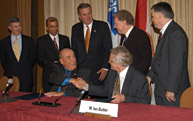Newsbites (Page 2)
Book Fair Booty

Each year, they eagerly line up hours ahead of time, waiting for the doors of Redpath Hall to swing open and the thrill of the hunt to begin. They've come for the McGill Book Fair, one of the most popular campus traditions of the fall. The fair is organized by the Women Associates of McGill and the McGill Women's Alumnae Association, who collect books throughout the year and unleash the deals in October to delighted bookworms from all over the city. You might find first editions of Winston Churchill's memoirs or a Mark Twain masterpiece. There is fascinating Canadiana, out-of-print cookbooks, trashy novels, arcane scientific tomes and much more to be found at the two-day event.
All funds raised go towards scholarships for McGill students, with over $1 million raised since the fair's inception in 1971. This year's book fair takes place October 20 and 21. Bring a big box and bring cash only.
Best of Both Worlds

Illustration: Jean-Bernard Sun
Some students want Dickens with their Darwin, Plato with their Pasteur and Gauguin with their Galileo. This fall, the University unveiled its new Bachelor of Arts and Science (BASc) program, geared towards undergraduates who want to immerse themselves in the types of courses that are offered by both of McGill's largest faculties.
According to Associate Dean of Science Morton Mendelson, the idea for the interfaculty program largely originated with students themselves. A group of undergraduates lobbied Mendelson and his counterpart in the Faculty of Arts, Dr. Enrica Quaroni, to launch a joint program. "They had a good idea and we seized on it," says Mendelson.
The program uses the Faculty of Arts multi-track approach, itself a recent innovation, as its template. Students in arts now have to specialize in at least two distinct disciplines - linguistics and history, for instance. BASc students can major in two disciplines, one from each faculty, or they can do a major in one faculty and two minors in the other. Interdisciplinary majors involving substantial input from both faculties, such as cognitive science, will be offered in the near future.
Students already enrolled at McGill were given the option of transferring into the BASc program this September. First-year students can sign up as of next autumn.
One of the first to take the plunge is Sara Askari, doing majors in both biomedical sciences and sociology. She began last year in physiology, mulling over a future career in medicine. "It was just too much science for me. I've always been interested in both arts and science and having just the science felt overwhelming." While there might be no obvious link between her two majors, "they are the things that interest me," Askari reasons.
Mendelson believes that as new professions become increasingly interdisciplinary, a degree like the BASc makes a lot of sense. "Look at something like biomedical ethics. Obviously you need to study philosophy and ethics, but you ought to know something about biological sciences as well."
McGill Teams Up with U-Miami

McGill researchers are no doubt looking forward to winter meetings at the University of Miami and exchange students will be packing their swimsuits after the deal signed by the two universities to work together on ventures in engineering and information technology. Possible areas of collaboration include the underwater robotics research that McGill scientists and engineers have been developing.
On a trade mission to Quebec this summer, Florida Governor Jeb Bush (centre) sealed the deal with Quebec premier Jean Charest (right of Bush) and McGill and University of Miami administrators. The agreement will encourage joint research ventures and faculty and student exchanges. "Establishing linkages between universities is an outstanding way to build mutually beneficial ties between Quebec and Florida," said Bush. "[This] agreement will serve as an excellent mechanism to expand cooperative interaction and shared innovations among our regions."
Ian Butler, McGill's Associate Vice-Principal (Research), sees the deal as part of McGill's expanding international network. "McGill is a key player in attracting some of the brightest minds from all over the world. This partnership will help us continue to forge strong relationships with sister institutions the world over."


